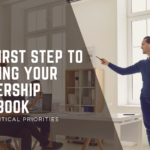There are so many reasons for professionals of all levels to seek support from an executive coach. What we hear from our clients as one of the most popular reasons is that they know of someone who has seen great success from working with a coach and they want the same results. Other reasons we hear include having too many priorities at one time, being pulled into uncharted territory, or simply wanting to grow and develop further as a professional.
Whatever your reason is for considering hiring an executive coach for yourself or for your team, I’d suggest your work through these three topics before taking the leap.
Commitment to professional development and growth
Before working with an executive coach, you may not be sure what development opportunities you need to work on. In fact, that may be exactly why you’re considering working with a coach. What you should be sure about, however, is why you want to work with a coach.
What big picture outcomes are you hoping to achieve? If, and when, you and the coach start to see improvements, how will that affect your career trajectory and even your long-term and short-term personal goals?
Are you ready to take on the burden of growing and developing as a professional? Or, are you just looking to prove to yourself that your current behaviors are on par and that any career challenges you’re facing are caused by something, or someone else?
Why does having a commitment to development and growth matter? Noted Stoic, Epictetus, stated it very clearly, “It’s impossible for a man to learn what he thinks he already knows”.
Look at it this way, if you feel like you have all the answers to being successful and feel that you’re being held back by others who need to change and improve, then you’re certainly not ready to invest time in working with an executive coach.
You need to understand your why first. Your why is going to be the reason you want to succeed. It will be your driving force behind wanting to grow and improve.
Once you have a clearly defined why and you’re ready to focus on the things that you can control, then you’re ready to go to the next step.
Questions to help define your why:
- What is my “why” behind career development? How will success in my current, or future role affect my current, and/or my future, situation?
- Are the challenges I’m experiencing something someone with more experience, knowledge, or ability could overcome, or are my challenges a result of the faults of others around me at work or in my personal life?
Be Ready to Step Out of Your Comfort Zone
Now that you have defined your “why” behind your career growth objectives, the next step is to make sure you’re ready to take on the pain that comes along with those ambitions.
We have a saying here at Benchmark that applies to our clients, and certainly applies to our coaches, “You either set your comfort zone around your goals, or set your goals around your comfort zone.”
It’s important to know that at first, working on your blind spots with a coach can be painful.
On the Brightside , you’ll find out later that once you’ve come to accept that blind spots are a natural part of any professional (or personal) growth, you’ll feel empowered to seek out blind spots and even have others help you identify them—but we’re not there yet.
To begin, you have to come to the realization that growth and development, even with an executive coach, requires vulnerability, being open to failure, accountability, and grit. Here’s why:
Vulnerability: Without the ability to own your weaknesses and mistakes, even in front of your boss, peers, and especially direct reports, makes it difficult for you to prime your mind to learn new and better ways to approach similar situations. And if you can’t show vulnerability in front of your direct reports, it will be difficult to help them grow and develop as well.
Open to failure: Realizing that if you’re not failing, you’re not trying. I can’t help but lean on the analogy of a baby learning to walk. Consider how many times a baby falls then successfully takes a step as she’s learning to walk. If babies approached walking the same way many professionals approach growth and development, none of us would be walking upright.
Accountability: Guess what, it’s difficult to develop beyond your current situation if you’re not willing to own the consequences your behaviors have on your success in your current environment. Sure, if you were a bug in a jar with some leaves and a stick your situation might be different, but that’s not where you are. You must be ready to own your growth for yourself and not blame something or someone else. Self-discipline and owning the challenges on your path to success is not optional, even when you’re working with a coach.
Grit: If your motto is, “I’ll try anything once.” but you’re not willing to get back up and try again, career success may not be right for you. In fact, it’s difficult to be successful without habitually living the Three Rights, the Right Attitude, Focusing on the Right Things, and Persevering Until You Get it Right, and once you have all three in check, you have to be willing to rinse and repeat day after day.
If you feel you’re not ready to own these factors yet, that’s okay. It’s likely you may just need some more time, and a few more missteps, to realize you’re going to feel the pain either way— you’ll feel the pain when you’re failing, or you’ll feel the pain when you’re growing.
Questions to Ask Yourself:
- Am I ready to focus my thoughts, my emotions, and my actions on the things I can control instead of the things that are out of my control?
- Am I ready to be vulnerable with all levels of my co-workers?
- Am I open to failing, learning from my failures, and quickly getting back up?
- Am I ready to be accountable for my actions and not blame others for the challenges I encounter each day?
- Am I prepared to work a little longer and try a little harder each day?
Is professional coaching what I need?
Once you’ve had a chance to address the two topics above, reflect on everything you’ve noted when reading this article and ask yourself if the voids you want to fill are from professional blind-spots and behavioral growth opportunities, or from mental-health and stress challenges that you need to address.
While professional coaches can have a tremendously positive affect on one’s career, coaches are not psychotherapists and cannot take the place of one.
We’ve been in situations where clients feel like their professional trajectory is more urgent than their mental health and that they feel they need an executive coach now so that they can feel secure enough to address their personal needs later. I would never recommend that approach to anyone in any situation.
In fact, in many cases of professionals in need of psychotherapy, they can work on both in order to address their professional growth as well as their personal mental-health wellness, so there’s no reason to down-play or delay the need to seek professional psychiatric support. Now the time has come for you to decide if you’re ready to take your career to the next level by working with an executive coach. Once you feel you’re ready, your next step is to select the best coach for your needs and get started.
Here’s to your professional growth and development!




